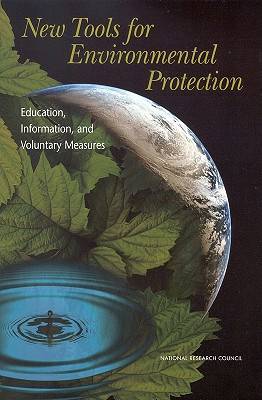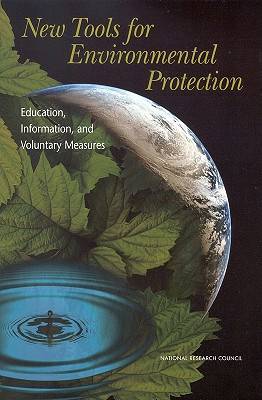
Bedankt voor het vertrouwen het afgelopen jaar! Om jou te bedanken bieden we GRATIS verzending (in België) aan op alles gedurende de hele maand januari.
- Afhalen na 1 uur in een winkel met voorraad
- In januari gratis thuislevering in België
- Ruim aanbod met 7 miljoen producten
Bedankt voor het vertrouwen het afgelopen jaar! Om jou te bedanken bieden we GRATIS verzending (in België) aan op alles gedurende de hele maand januari.
- Afhalen na 1 uur in een winkel met voorraad
- In januari gratis thuislevering in België
- Ruim aanbod met 7 miljoen producten
Zoeken
New Tools for Environmental Protection
Education, Information, and Voluntary Measures
National Research Council, Division of Behavioral and Social Sciences and Education, Committee on the Human Dimensions of Global Change
Paperback | Engels
€ 111,45
+ 222 punten
Omschrijving
Many people believe that environmental regulation has passed a point of diminishing returns: the quick fixes have been achieved and the main sources of pollution are shifting from large "point sources" to more diffuse sources that are more difficult and expensive to regulate. The political climate has also changed in the United States since the 1970s in ways that provide impetus to seek alternatives to regulation.
This book examines the potential of some of these "new tools" that emphasize education, information, and voluntary measures. Contributors summarize what we know about the effectiveness of these tools, both individually and in combination with regulatory and economic policy instruments. They also extract practical lessons from this knowledge and consider what is needed to make these tools more effective.
The book will be of interest to environmental policy practitioners and to researchers and students concerned with applying social and behavioral sciences knowledge to improve environmental quality.
This book examines the potential of some of these "new tools" that emphasize education, information, and voluntary measures. Contributors summarize what we know about the effectiveness of these tools, both individually and in combination with regulatory and economic policy instruments. They also extract practical lessons from this knowledge and consider what is needed to make these tools more effective.
The book will be of interest to environmental policy practitioners and to researchers and students concerned with applying social and behavioral sciences knowledge to improve environmental quality.
Specificaties
Betrokkenen
- Auteur(s):
- Uitgeverij:
Inhoud
- Aantal bladzijden:
- 368
- Taal:
- Engels
Eigenschappen
- Productcode (EAN):
- 9780309084222
- Verschijningsdatum:
- 13/07/2002
- Uitvoering:
- Paperback
- Formaat:
- Trade paperback (VS)
- Afmetingen:
- 152 mm x 226 mm
- Gewicht:
- 612 g

Alleen bij Standaard Boekhandel
+ 222 punten op je klantenkaart van Standaard Boekhandel
Beoordelingen
We publiceren alleen reviews die voldoen aan de voorwaarden voor reviews. Bekijk onze voorwaarden voor reviews.









